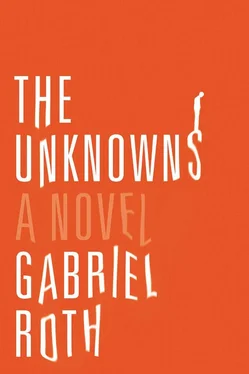We sat in silence for at least ten minutes before others began to arrive, many in groups of three or four who had carpooled or arranged to meet outside. I tried to believe that they were as anxious as I was, despite the casual way they picked seats, chatted, called out to one another. This kind of information is inherently distorted: we see others from the outside, all smooth surfaces and fixed appearances, and ourselves from the inside, with our subjectivities and histories and bodily fluids.
The room’s population self-organized into groups of people who’d gone to middle school together. The only person I recognized from Wilson, April Melkonian, seemed to have no idea who I was. The year before, she had allegedly let Jason Kroll feel her tits for one minute in exchange for writing her nature diary for biology class. All I could see of the girl in front of me was a cascade of brown hair held back by a blue velour hairband. On my right, two Asian boys were telling an Asian girl about going to Wet City and how fun it was. Wet City was a local water park. The seat to my left was still empty.
And then in walked Bill Fleig, and before I knew his name I knew that he was going to sit down next to me and determine the direction of my life for the whole of high school and perhaps beyond, and then he did.
He was almost freakishly tall for a fourteen-year-old, with an overbite so intense his jaw seemed to stop halfway to his upper lip. He peered around the classroom, saw the open seat, then made his way over. He had to kind of fold himself at the waist to fit into the chair, and then he didn’t seem to know what to do with his arms; he wound up draping them over the desk. Trying to avoid eye contact I looked down and futzed with my pencil case, which turned out to be my fatal mistake, because it allowed him to see my calculator.
“Is that a Texas Instruments TI-80?” he asked, and I had to acknowledge that it was.
“I had one of those,” he said. “Then I got this for my birthday.” He handed me his calculator right there in front of everyone. I took it as though it were a fish, looked it over quickly, and passed it back to him. “I’m Bill Fleig,” he said, like an adult. “Do you have a computer?”
“Yeah,” I said, hoping no one besides Bill Fleig would hear. The girl in front of me, the one with the hair, turned around, and I was afraid she was about to call me a loser. She turned out to have a big nose and cheeks that looked padded with cotton wool, but she was a girl.
To my relief she addressed Bill Fleig. “You shouldn’t use a calculator,” she said. “You’ll start to depend on it, and then you’ll never be able to do arithmetic without one.”
Bill Fleig had heard this argument before. “I carry it with me, so I won’t need to do arithmetic without one,” he said. I was horrified but somehow unsurprised that this conversation was taking place near me, as if I were sending out invisible, contagious nerd rays.
“What if you’re on a plane and it crashes on a desert island?” the girl asked.
“I’d have it with me on the plane, wouldn’t I?” said Bill Fleig.
“You might forget to pack it,” said the girl. “Or the battery might run out.”
“I’d carry extra batteries with me if I was going on a plane,” said Bill Fleig. He spoke in a breathless, hyperarticulated way, as if his lips and tongue were struggling to keep up with the words.
“It doesn’t matter how many batteries you have,” she said. “They’re going to run out eventually, and then you won’t be able to do math.”
I couldn’t stop myself. “Why would he need to do math if he’s stuck on a desert island?” I said. It came out too loud, and the Asian guy to my right turned to see what was going on.
“I might need to calculate the angle for a lean-to,” Bill Fleig said. “I might need to do long division to figure out how to divide up the food among the people who are on the island with me.”
“He might need to calculate where to put up a sundial,” said the girl.
“I wouldn’t need a sundial,” said Bill Fleig, extending his wrist to display a chunky digital watch.
“You shouldn’t wear a digital watch,” the girl said. “You’ll forget how to tell time.”
Mercifully, the teacher walked in. She was fat, and I hoped that meant she’d be jolly; it would be nice to have a jolly fat lady for a teacher. “All right, you guys,” she said, louder than the situation warranted, since we had quieted down as soon as she walked in. She didn’t sound jolly. She called roll, and I got that slight nervous feeling you get the first time they call roll and you don’t know who’s before you in the alphabet, and you’re afraid you’re going to miss your name or answer too emphatically or you won’t be on the list at all. But she read my name, and I answered fine, and I experienced the tiny sensation of pride and belonging that you get after they call roll for the first time. As we headed out for the first-day assembly, I surveyed the kids in front of me and realized that none of them had ever seen me before. I felt a strange excitement building, the kind stowaways must feel as they watch the coastline recede: my identity was up for grabs.
We must have been the last homeroom to arrive in the auditorium. The student body was catching up after summer vacation, saying Omigod and How’s it going ? to the kids next to them, behind them, several rows away. As I looked down at the crowd I was staggered and overwhelmed by the endless varieties of girls: Girls who were going for cute and girls who were going for sexy and girls who were going for normal. Soccer players in shorts and sweatshirts and future English majors in long Laura Ashley skirts. Girls with big breasts who were trying to hide them and girls with big breasts who were trying to show them off. Christian girls in button-down sweaters and nerd girls in overalls and rocker girls in black T-shirts with elaborate heavy-metal iconography. Groups of pretty girls, groups of almost pretty girls, ugly girls in ones and twos. It was an impossibly rich and complex zoology. I froze momentarily, and the people flooding in behind me pushed me forward and I stumbled and nearly fell.
I began by gathering data. Accounting for overlaps, my seven classes plus homeroom contained forty-six distinct girls. I listened for their names during roll and wrote them in a notebook, along with a quick notation indicating something about their physical appearance to remind me who was who. Once I’d got the names I started pruning. I wasn’t picky. To the least desirable girls I applied a litmus test: Would I prefer to be involved with her or to graduate high school without ever acquiring a girlfriend? That knocked out seven and left Rita Bambrick, whose head looked like one of the Easter Island statues, on the borderline.
And so I started tracking thirty-nine girls: their friends, interests, cliques, extracurriculars. After two weeks of fieldwork I had compiled a fairly thorough ethnography of the freshman class’s female population. I identified the groups, the pairings, the loners, the girls with steady boyfriends and the girls who dated around and the girls who were concentrating on their schoolwork. I rated them on a few crucial axes: studiousness, athleticism, sociability, sexual maturity (at one end of the spectrum was Erica Watterson, who was famous for her promiscuity; at the other was Pamela Beal, who was obsessed with horses), and social status. I was certain that this data would be useful to me, and that when I had accumulated enough of it I would know what to do with it.
As I walked out of history during the second week, Tara Pulowski fell in beside me. “How’s it going, Eric?” she said, and I was thrilled to hear her call me by my name. My left hand instinctively reached behind me to verify that the zipper on my backpack was secure. Inside the backpack was the ring-bound notebook in which Tara’s name was written next to the words “curly brown hair” and the glyphs for pretty and rich .
Читать дальше












